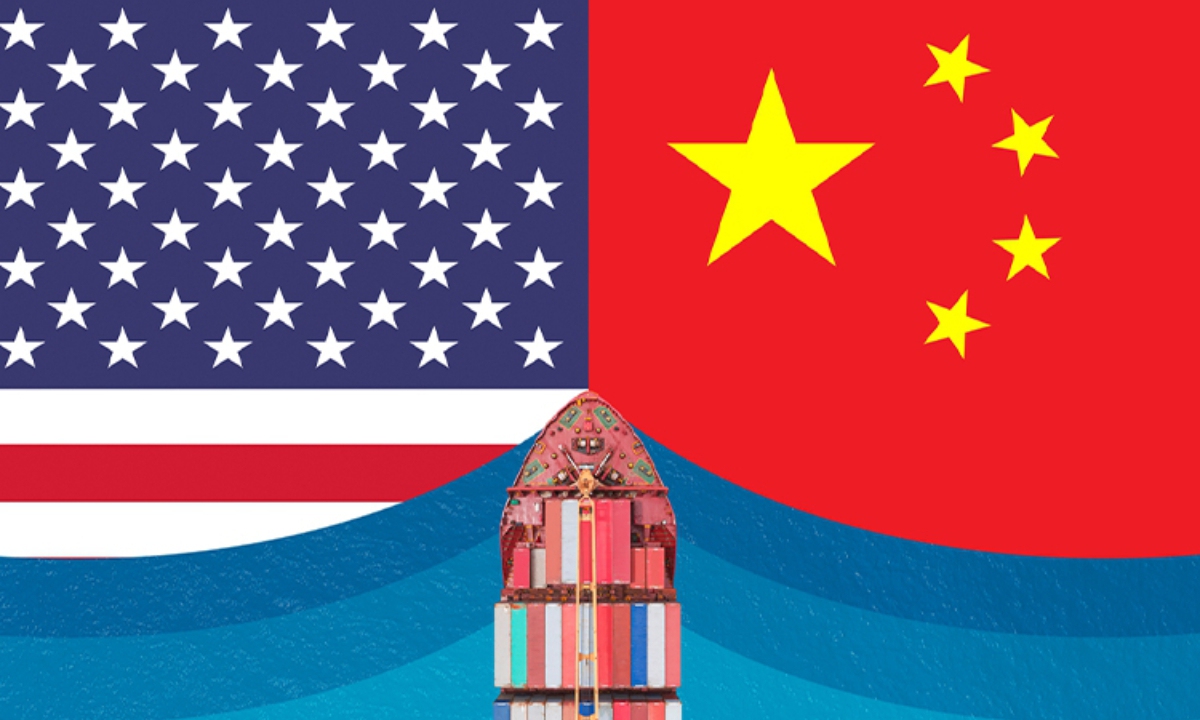
Photo: GT
A fresh round of economic and trade talks between Chinese and US high-level officials ahead of the upcoming China-US summit meeting in San Francisco next week agreed against "decoupling" and emphasized the paramount importance of ensuring healthy economic and trade relations.
High-level China-US economic and trade talks made substantial steps in building trust in stabilizing economic and trade relations, preparing for potential economic outcomes for the upcoming China-US summit meeting, Chinese experts said, noting the importance for the two sides to eliminate differences in understanding on the consensus against "decoupling."
Chinese Vice Premier He Lifeng met with US Treasury Secretary Janet Yellen several times during his visit to the US from November 8 to 12, with cumulative duration of the talks reaching 10 hours, the pair struck consensus on strengthening communication and against "decoupling," according to a statement released by the Ministry of Finance on Saturday.
Both sides are committed to implementing the important consensus reached by the leaders of China and the US, preparing for the economic outcomes of the for the upcoming China-US summit meeting in San Francisco, and promoting the return of China-US economic and trade relations to a healthy and stable development track, according to the statement.
Both sides agreed to strengthen communication, seek consensus, manage differences, and avoid misunderstandings that may lead to escalating friction, the statement read.
The meeting welcomes the establishment of a China-US economic and financial working group led by deputy ministerial officials, reporting to the lead persons for China-US economic and trade affairs. The lead persons for China-US economic and trade affairs agreed to regular direct communication, according to the statement.
The economic relationship between China and the US is built upon shared interests. Strong cooperation is driven by a solid foundation and immense potential, but it requires equality and mutual respect as a prerequisite. Only by addressing the legitimate concerns of both parties can the bilateral economic and trade relationship truly remain stable and achieve long-term development, Vice Finance Minister Liao Min said, in response to whether China-US economic and trade relationship comes to a turning point.
The outcome of the fresh round of economic and trade talks between Chinese and US high-level officials was within expectations, as it continued to strengthen high-level engagement between the world's two largest economies seeking to stabilize bilateral ties for some time, He Weiwen, senior fellow of the Center for China and Globalization, told the Global Times on Saturday.
"The length of this discussion indicates that both the Chinese and American sides have shown patience, which demonstrates the importance of the economic relationship as part of overall China-US relations," He Weiwen said.
The meeting set the stage for the economic agenda to be discussed at the upcoming China-US summit, He Weiwen noted.
High-level China-US economic and trade talks made substantial steps in building trust in stabilizing economic and trade relations, Li Haidong, a professor at the China Foreign Affairs University, told the Global Times.
The core of the communication is to ensure further and extensive cooperation between the two parties, effectively manage divisive issues, and gradually alleviate tension, in order to maintain a stable and fruitful economic and trade relationship between China and the US, Li said.
The Chinese side has clearly expressed concern about the US restrictions on bilateral investment, sanctions against Chinese companies, export controls, and tariffs on China. China demands that the US respond with concrete actions. The talks were candid, pragmatic, in-depth, and constructive, Xinhua reported.
The meeting emphasized that China and the US do not seek economic "decoupling" and welcome the development of healthy economic relations, providing a fair competitive environment for businesses and workers in both countries, the report said.
Although the US has repeatedly denied "decoupling," its restrictive measures on China in economic and trade matters indicate that it has not changed its monopolistic and zero-sum approach, which contradicts its statements of "not decoupling," Chinese experts noted.
There are still obvious differences in understanding between China and the US regarding the issue of whether the US is pushing "decoupling" in the economic and trade field, Li said.
The series of specific concerns raised by the Chinese side indicate that the US is still moving toward "decoupling" in its economic and trade policies toward China. The US side can only address China's concerns and eliminate communication barriers to the maximum extent through taking action, so as to promote the healthy development of bilateral economic and trade relations, Li noted.
Despite repeatedly stating that it does not seek to "decouple" from China in terms of trade and investment, the US has yet to take concrete actions. The US' "small yard, high fence" approach in trade and investment restrictions, which attempts to exclude China from supply chains based on its own values, contradict its claims of not seeking "decoupling," He Weiwen noted.
To promote the healthy development of bilateral economic and trade relations, the US needs to strike a balance between competition and cooperation. By moving toward China, managing differences, and expanding the scope of cooperation, the differences will become more manageable, the expert added.
Global Times




